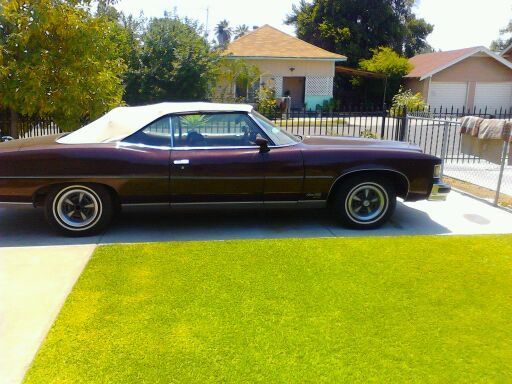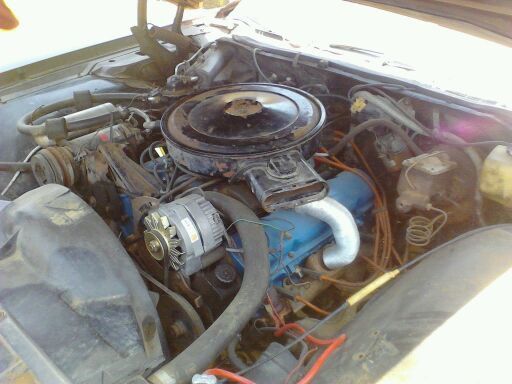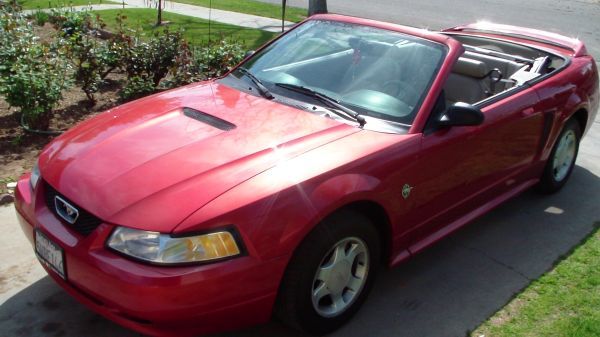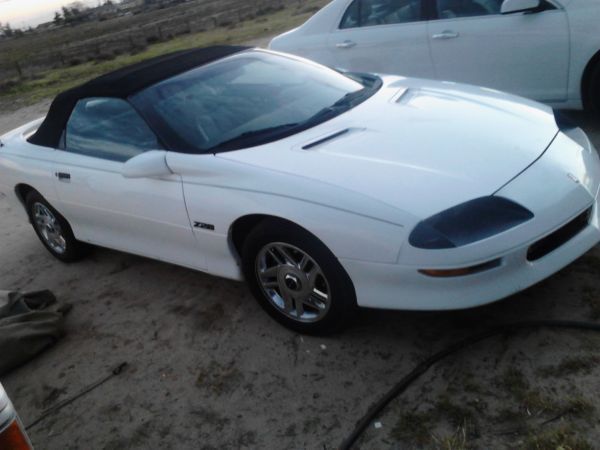Of the three, I'd go with the Grandville. I will never own another Ford. First of all, while we're calling this a "classic" car, that's more for its age, not its desirability among collectors. Perhaps "popularity" would be a better word. As a result, it's going to cost you less than the other two. Those other two are going to have numerous computers that can provide neat features but they also lead to expensive repairs that you can't work around except to replace them when they cause a problem. Newer cars have a lot more problems than older ones but it's partly because there's a lot more stuff in them that can develop those problems. You'll find very few newer cars broken down on the side of the road but that doesn't mean the owners aren't driving with the Check Engine light on, the air conditioning doesn't work because of a computer malfunction, or the radio quit so they have to sing to themselves. Read through these forums and you'll see the kinds of problems that keep on popping up over and over. In probably 95 percent of the problems, people are still able to drive the car.
I misunderstood Wrenchtech's comment about carburetors. It's true the newer cars with electronic fuel injection are going to run smoother, (when everything is working properly), and I like it that they're much cleaner but there hasn't been the same increase in fuel mileage as there was with a decrease in emissions. I would never want to go back to a carburetor if I had a choice, but I have three cars with them and operating them is just the "nature of the beast". You get used to them, then when you hop into something newer, you just appreciate it that much more.
Wrenchtech is thinking more about the pleasure of driving a newer car that you start up and go. I personally can put up with a lot of inconvenience. My interest lies in making repairs, and can I do them in my driveway? Every car is going to need them sooner or later, and there's not much you'll be able to do yourself on the newer cars until you learn more about how the systems work.
Look at how easily accessible everything is under the hood. It's hard enough learning how to maintain and repair a car without adding in another dimension of difficulty right away. As for the parts, hmac300 is right. You don't want to go all over the country looking for parts, but I really doubt that is going to be a problem. I plowed into a girl who turned in front of me a few years ago. I flattened the right rear suspension on her Taurus and pushed the wheel and strut half way to the other side of the car. Had I known at the time I could have pulled the fender away from rubbing on the right front tire, I could have driven my Challenger home. The headlights didn't even get broken. I can't make the argument that old cars were safer, but her car was totaled and mine needed a new fender, hood, and bumper. I had no trouble finding used parts. With this Pontiac, you are going to have WAY less trouble finding those kinds of parts new. A number of companies make reproduction body parts for older GM cars and trucks. I only mentioned the old car show swap meets to point out that the stuff is readily available, but we should probably talk about that only if the need arises. I doubt you're planning on piling into someone.
You will not have a problem finding the normal maintenance items at any auto parts store. Stop in by one and ask if they have brake pads, air filters, water pumps, and fuel pumps in stock. You'll find out how inexpensive those parts are for that car. Fuel pumps and water pumps fail just as often on newer cars but they're harder for a do-it-yourselfer to replace.
By the way, the Grandville appears to have a new generator on it. (Wrenchtech is rolling his eyes now). That was a very good design and easy to diagnose and repair. I have a few pages on repairing it on my web site. The generator on the Camaro is going to cost a lot more and fail much more often.
I suspect insurance is going to cost less for the Grandville. You may not be able to get collision coverage due to the age. That covers the cost of repairs only to your car if the crash is your fault. THAT'S when you need to be concerned with the availability of body parts. Chrysler never licensed anyone to make reproduction fenders for my Challenger, but I found a used one. GM DID license other companies to make stuff, so between that, and the ease of finding normal parts, I wouldn't have the slightest concern about finding parts. Shoot, there's a lot of unhappy Ford owners with five to seven-year-old cars who can't find suspension parts at a reasonable cost.
Another one of my arguments against newer cars is their insufferable use of anti-theft systems. Every manufacturer has their share of systems that are very effective at keeping owners from driving their cars. I only have one car with an anti-theft system but I only drive it about once every other year so it's not a concern. None of my other cars will ever let me sit because the computer doesn't recognize they key I've always been using, or there's a broken wire in the steering column, or a voltage spike tricked two computers into self-installing the anti-theft programming when it doesn't exist on the car. (That's an older Chrysler problem). Of course, few people would care to steal the kind of cars I drive. In fact, I could leave the keys in my rusty trusty '88 Grand Caravan daily driver with the windows rolled down, and a full tank of gas, and still no one would swipe it!
If my vote were to count for anything, I wouldn't even consider looking at the other two cars. We're all assuming the Grandville is going to need repairs, but the reality is all three of them are going to need repairs. Do you want to spend lots or little for parts? Do you want to be able to get to those parts and work on the car yourself, or do you plan on taking it to a shop every time something comes up. Most reputable shops are charging around $100.00 per hour for labor, and if you could see my list of expenses, taxes, regulations, and other costs of doing business, you'd wonder how they could afford to stay in business by charging so little. Just had a visit today from a friend who took his truck in for just a diagnosis of a running problem. No repairs, just a "guess" on what he should try first. Cost him $198.00 for an opinion and a few sheets of paper!
I had a lot of former students who seemed to have $800.00 repair bills every six months on their Grand Ams, and they seemed to think that was normal. It's not. I only started to pay attention because there were so many of them, (the cars AND the repair bills). My Caravan cost me 45 bucks for a muffler that I wasn't happy about, and nine bucks for a brush assembly for the alternator. That's what I spent on repair parts in the last three years. I wouldn't be the least bit surprised if you spent the same amount on the Pontiac.
I mentioned I can put up with a lot, but one thing I can't tolerate is torn seat covers. At that point the car becomes a personal transportation device to get me somewhere faster than walking, but it's no pleasure to be in it. Look at the upholstery, then look at the wear on the carpet under the brake pedal and look at the wear on the pedal pads. That will give you some idea of how the car was cared for. I've even seen pens and pencils stabbed into the foam on the front of dash boards. Normal wear is one thing but that screams of not caring one bit about even trying to take care of the car.
There's two sides to the argument of electrical problems. There's going to be a ton of them on newer cars with lots of computers, but when you consider the miles of wire and the complexity, it's a wonder there aren't way more problems than we already see. I don't know what Wrenchtech was thinking when he mentioned that, but there are some things that come to mind. First of all, around that time period, (or perhaps a little later), GM tried using aluminum wire to save weight or cost or both. It's always a no-no to pierce wire insulation to take voltage readings but if you do that with aluminum wire, you can be sure it will corrode there within a few months. I worked on one Firebird that had intermittent tail lights. That ended up being a corroded wire where it was exposed at a brass rivet in the fuse box right in front of the driver's feet. Right where the salt ran off his shoes in winter. The salt caused the corrosion. Finding problems like that will be a lot easier than on newer cars, but repairs can be a little tricky when the wire just crumbles away.
The other thought is we used to see a lot of overheated terminals in electrical connectors. Back then it was due to a less than perfect connection that caused a little heat buildup which got progressively worse until you smelled smoke and connectors melted. That was somewhat common on early '70s Chrysler products. Don't know if that was an issue on other car brands. The good news is that once those problems are fixed, you go back to driving. When computers are involved, you have to wonder if one got damaged from arcing connections and voltage spikes.
Those are MY wondrous opinions. Others will disagree because we value different parts of car ownership differently, so ultimately you have to decide what you want to drive around in. You know you can always come back here for information and advice. I'll be adding some web pages soon on the HEI and Chrysler ignition systems as soon as I make up some drawings and take some photos. If there's other circuits you're interested in, let me know and I'll try to add them.
Wednesday, April 4th, 2012 AT 2:05 AM







